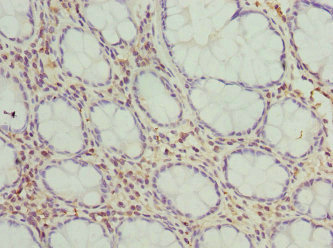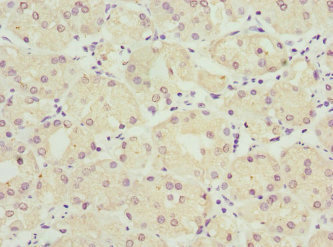FMO1 Antibody
-
货号:CSB-PA008746ESR2HU
-
规格:¥440
-
促销:
-
图片:
-
其他:
产品详情
-
产品名称:Rabbit anti-Homo sapiens (Human) FMO1 Polyclonal antibody
-
Uniprot No.:Q01740
-
基因名:FMO1
-
别名:Dimethylaniline monooxygenase [N oxide forming] 1 antibody; Dimethylaniline monooxygenase [N-oxide-forming] 1 antibody; Dimethylaniline oxidase 1 antibody; Fetal hepatic flavin containing monooxygenase 1 antibody; Fetal hepatic flavin-containing monooxygenase 1 antibody; Flavin containing monooxygenase 1 (fetal liver) antibody; Flavin Containing Monooxygenase 1 antibody; FMO 1 antibody; FMO1 antibody; FMO1_HUMAN antibody; OTTHUMP00000033536 antibody; OTTHUMP00000033537 antibody
-
宿主:Rabbit
-
反应种属:Human
-
免疫原:Recombinant Human Dimethylaniline monooxygenase [N-oxide-forming] 1 protein (363-532AA)
-
免疫原种属:Homo sapiens (Human)
-
标记方式:Non-conjugated
-
克隆类型:Polyclonal
-
抗体亚型:IgG
-
纯化方式:Antigen Affinity Purified
-
浓度:It differs from different batches. Please contact us to confirm it.
-
保存缓冲液:PBS with 0.02% sodium azide, 50% glycerol, pH7.3.
-
产品提供形式:Liquid
-
应用范围:ELISA, IHC
-
推荐稀释比:
Application Recommended Dilution IHC 1:20-1:200 -
Protocols:
-
储存条件:Upon receipt, store at -20°C or -80°C. Avoid repeated freeze.
-
货期:Basically, we can dispatch the products out in 1-3 working days after receiving your orders. Delivery time maybe differs from different purchasing way or location, please kindly consult your local distributors for specific delivery time.
靶点详情
-
功能:This protein is involved in the oxidative metabolism of a variety of xenobiotics such as drugs and pesticides. Form I catalyzes the N-oxygenation of secondary and tertiary amines.
-
基因功能参考文献:
- Report developmental regulation of hepatic FMO1 expression. PMID: 26839369
- Study tested the genetic effects of three FMOs genes (FMO1, FMO3, and FMO6P) on nicotine dependence by performing targeted sequencing on 2,852 nicotine-dependent and nondependent smokers; identified significant association signals for gene FMO1 and FMO6P PMID: 28413702
- data support the role of FMO3 in the N-oxidation of OLA and implicate for the first time the contribution of FMO1 and its functional *6 variant in OLA disposition PMID: 23147717
- polymorphisms in FMO1 are significant risk factors in the development of nicotine dependence and that the mechanism may involve variation in nicotine pharmacology. PMID: 21540762
- The results of this study suggested that the alteration of FMO gene expression is a consequence of the pathological environment linked to oxidative stress related to mutated SOD1. PMID: 21082301
- FMO1 expression is restricted to the fetus; FMO1 suppression occurred within 3 d postpartum in a process tightly coupled to birth, but not gestational age. PMID: 11809920
- data from transient expression assays in HepG2 cells suggested this SNP could account for a 2- to 3-fold loss of FMO1 promoter activity. PMID: 12829732
- ...in fetal liver, where FMO1 predominates attaining expression levels of (about) 32% of expressed CYP3A4. p. 574 "...recent examples indicate that FMOs play a prominent role in the metabolism ...of important drugs." p. 575 PMID: 15203093
- FMO1 was found to be down-regulated in human adult brain tissue. PMID: 16183778
- Early studies described in this review document that FMO1 is the most abundant FMO enzyme in the human fetal liver, whereas FMO3 is essentially absent. PMID: 16863467
- Specific allelic variants of the FMO1 gene might be associated to susceptibility to develop ALS. PMID: 17127561
- The resulting data showed that N,N-dimethylamphetamine N-oxidation is mainly mediated by FMO1. PMID: 19552509
显示更多
收起更多
-
亚细胞定位:Microsome membrane; Single-pass membrane protein. Endoplasmic reticulum membrane; Single-pass membrane protein.
-
蛋白家族:FMO family
-
组织特异性:Expressed mainly in fetal and adult liver.
-
数据库链接:
HGNC: 3769
OMIM: 136130
KEGG: hsa:2326
STRING: 9606.ENSP00000346901
UniGene: Hs.1424
Most popular with customers
-
-
YWHAB Recombinant Monoclonal Antibody
Applications: ELISA, WB, IF, FC
Species Reactivity: Human, Mouse, Rat
-
Phospho-YAP1 (S127) Recombinant Monoclonal Antibody
Applications: ELISA, WB, IHC
Species Reactivity: Human
-
-
-
-
-























